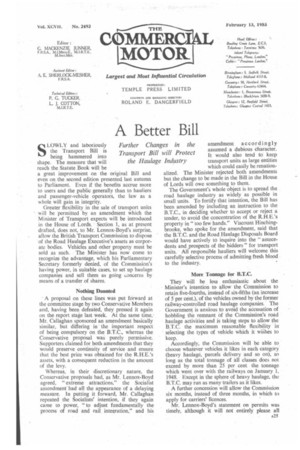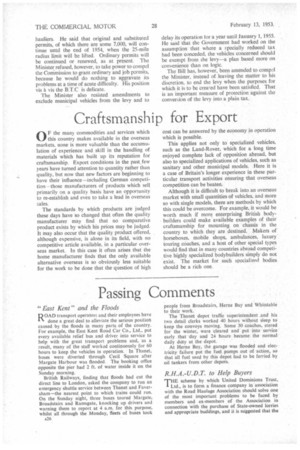A Better Bill
Page 27

Page 28

If you've noticed an error in this article please click here to report it so we can fix it.
SLOWLY and laboriously the Transport Bill is being hammered into shape. The measure that will reach the Statute Book will be a great improvement on the original Bill and even on the second edition presented last autumn to Parliament. Even if the benefits accrue more to users and the public generally than to hauliers and passenger-vehicle operators, the law as a whole will gain in integrity.
Greater flexibility in the sale of transport units will be permitted by an amendment which the Minister of Transport expects will be introduced in the House of Lords. Section 1, as at present drafted, does not, to Mr. Lennox-Boyd's surprise, allow the British Transport Commission to dispose of the Road Haulage Executive's assets as corporate bodies. Vehicles and other property must be sold as such. The Minister has now come to recognize the advantage, which his Parliamentary Secretary formerly denied, of the Commission's having power, in suitable cases, to set up haulage companies and sell them as going concerns by means of a transfer of shares.
Nothing Daunted A proposal on these lines was put forward at the committee stage by two Conservative Members and, having been defeated, they pressed it again on the report stage last week. At the same time,Mr. Callaghan sponsored an amendment basically similar, but differing in• the important respect of being compulsory on the B.T.C., whereas the Conservative proposal was purely permissive. Supporters claimed for both amendments that they would preserve continuity of service and ensure that the best price was obtained for the R.H.E.'s assets, with a consequent reduction in the amount of the levy.
Whereas, in their discretionary nature, the Conservative proposals had, as Mr. Lennox-Boyd agreed, "extreme attractions," the Socialist amendment had all the appearance of a delaying measure. In putting it forward, Mr. Callaghan repeated the Socialists' intention, if they again came to power, "to adjust fundamentally the process of road and rail integration," and his amendment accordingly assumed a dubious character. It would also tend to keep transport units as large entities which could easily be renationalized. The Minister rejected both amendments but the change to be made in the Bill in the House of Lords will owe something to them.
The Government's whole object is to spread the road haulage industry as widely as possible in small units. To fortify that intention, the Bill has been amended by including an instruction to the B.T.C., in deciding whether to accept or reject a tender, to avoid the concentration of the R.H.E.'s property in "too few hands." Viscount Hinchingbrooke, who spoke for the amendment, said that the B.T.C. and the Road Haulage Disposals Board would have actively to inquire into the "antecedents and prospects of the bidders" for transport units. All responsible hauliers will welcome this carefully selective process of admitting fresh blood to the industry.
More Tonnage for B.T.C.
They will be less enthusiastic about the Minister's intention to allow the Commission to retain five-fourths, instead of six-fifths (an increase of 5 per cent.), of the vehicles owned by the former railway-controlled road haulage companies. The Government is anxious to avoid the accusation of hobbling the remnant of the Commission's road haulage activities and is taking steps to allow the B.T.C. the maximum reasonable flexibility in selecting the types of vehicle which it wghes to keep.
Accordingly, the Commission will be able to choose whatever vehicles it likes in each category (heavy haulage, parcels delivery and so on), so long as the total tonnage of all classes does not exceed by more than 25 per cent the tonnage which went over with the railways on January 1, 1948. Except in the sphere of heavy haulage, the B.T.C, may run as many trailers as it likes.
A further concession will allow the Commission six months, instead of three months, in which to apply for carriers' licences.
Mr. Lennox-Boyd's statement on permits was timely, although it will not entirely please all A25 hauliers. He said that original and substituted permits, of which there are some 7,000, will continue until the end of 1954, when the 25-mile radius limit will be lifted. Ordinary permits will be continued or renewed, as at present. The Minister refused, however, to take power to compel the Commission to grant ordinary and job permits, because he would do nothing to aggravate its problems at a time of acute difficulty. His position vis 'a vis the B.T.0 is delicate.
The Minister also resisted amendments to exclude municipal vehicles from the levy and to delay its operation tor a year until January 1, 1955. He said that the Government had worked on the assumption that where a specially reduced tax had been conceded, the vehicles concerned should be exempt from the levy—a plan based more on convenience than on logic.
The Bill has, however, been amended to compc1 the Minister, instead of leaving the matter to his discretion. to end the levy when the purposes for which it is to be created have been satisfied. That is an important measure of protection against the conversion of the levy into a plain tax.




















































































